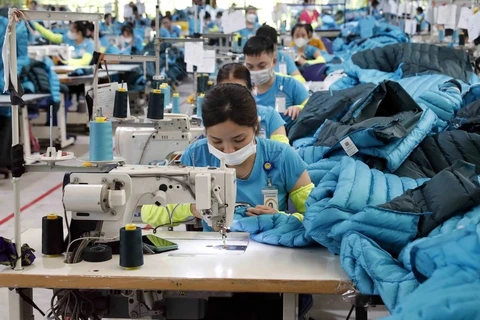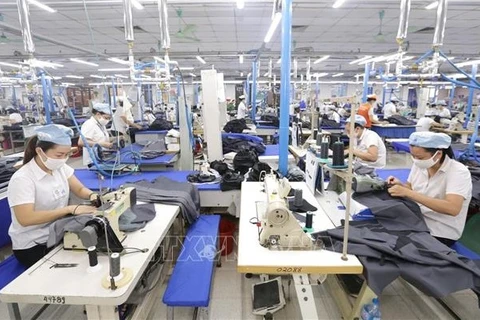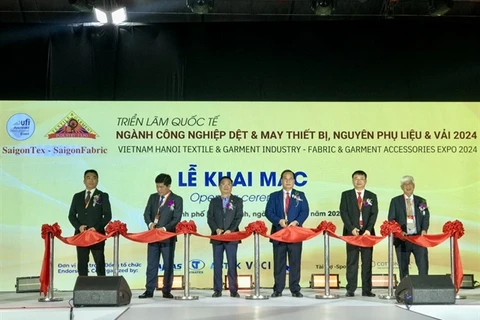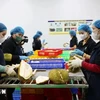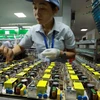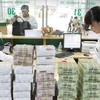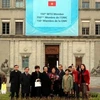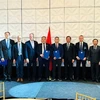Hanoi (VNA) – The Vietnamese garment and textile sector is carrying out various measures to bolster production and business activities amidst formidable challenges posed by falling demand, high inventory, and geopolitical instability in several countries, according to insiders.
Enterprises have received more export orders but seen no improvement in prices while several contracts even plunge 30-50% in value, they said.
Furthermore, cotton prices are expected to soar in the coming time due to speculation and logistics difficulties. In the meantime, it could be hard for Vietnamese firms to compete in the Chinese market where tax incentive and support policies on transport costs and electricity have been rolled out to back up domestic production.
Against this backdrop, General Director of the Vietnam National Textile and Garment Group (Vinatex) Cao Huu Hieu said that firms need to capitalise on all opportunities, make rational forecast, and get updated with the situation so as to take timely measures.
Besides, they should drastically restructure their organisations, apply advanced management solutions, and push ahead projects that help improve productivity, he added.
Vinatex Chairman Le Tien Truong stressed that besides challenges, there is ample room for development for those with sound business strategies, diverse products, deep engagement in supply chain, and rational steps towards digital economy and green economy.
The group will keep a close watch on the market and operation of its members so as to pen flexible and breakthrough measures to develop products and seek new markets to ensure business efficiency, he said.
Meanwhile, Chairman of Hung Yen Garment Corporation Joint Stock Company Nguyen Xuan Duong held that high input cost and workforce transition to such markets as the Republic of Korea and Japan have placed a burden on the company.
Along with global demand falling by 5-10%, large fashion brands teetering on the brink of bankruptcy is another challenge that makes it hard for Vietnamese firms to recover tens of millions of USD, he said.
Duong suggested competent ministries and sectors to issue suitable policies to help enterprises get access to capital to strengthen investment and bolster production, adding workers also need assistance to improve their livelihoods.
During January – March, the garment and textile sector’s export turnover grew nearly 10% year-on-year to some 10 billion USD, a locomotive for enterprises to fulfill the set target of 44 billion USD for the whole year./.
Enterprises have received more export orders but seen no improvement in prices while several contracts even plunge 30-50% in value, they said.
Furthermore, cotton prices are expected to soar in the coming time due to speculation and logistics difficulties. In the meantime, it could be hard for Vietnamese firms to compete in the Chinese market where tax incentive and support policies on transport costs and electricity have been rolled out to back up domestic production.
Against this backdrop, General Director of the Vietnam National Textile and Garment Group (Vinatex) Cao Huu Hieu said that firms need to capitalise on all opportunities, make rational forecast, and get updated with the situation so as to take timely measures.
Besides, they should drastically restructure their organisations, apply advanced management solutions, and push ahead projects that help improve productivity, he added.
Vinatex Chairman Le Tien Truong stressed that besides challenges, there is ample room for development for those with sound business strategies, diverse products, deep engagement in supply chain, and rational steps towards digital economy and green economy.
The group will keep a close watch on the market and operation of its members so as to pen flexible and breakthrough measures to develop products and seek new markets to ensure business efficiency, he said.
Meanwhile, Chairman of Hung Yen Garment Corporation Joint Stock Company Nguyen Xuan Duong held that high input cost and workforce transition to such markets as the Republic of Korea and Japan have placed a burden on the company.
Along with global demand falling by 5-10%, large fashion brands teetering on the brink of bankruptcy is another challenge that makes it hard for Vietnamese firms to recover tens of millions of USD, he said.
Duong suggested competent ministries and sectors to issue suitable policies to help enterprises get access to capital to strengthen investment and bolster production, adding workers also need assistance to improve their livelihoods.
During January – March, the garment and textile sector’s export turnover grew nearly 10% year-on-year to some 10 billion USD, a locomotive for enterprises to fulfill the set target of 44 billion USD for the whole year./.
VNA

